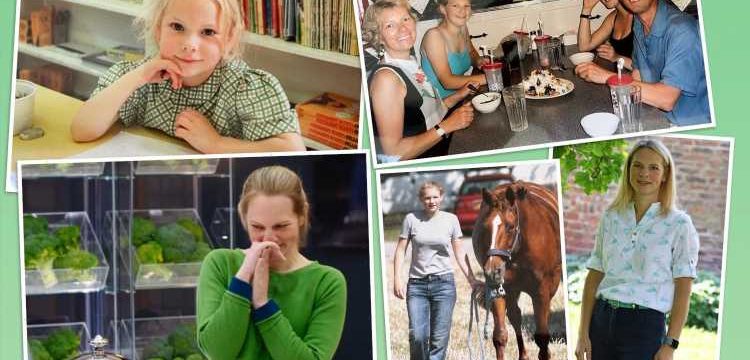Charlotte Whittle, 34, from North Yorkshire, is an equestrian coach.
"Walking into the supermarket, I quickly turned away from the vegetable aisle, as just a glimpse of broccoli was enough to make my palms sweat.
I hadn’t eaten a vegetable since I was a child as I suffered from food phobias so extreme, I’d been living on chicken nuggets and rice cakes for years.
Growing up, I was told by my parents Judy, now 64, and Chris, 66, that if I didn’t finish my dinner, I’d go hungry.
But if I tried to eat something I didn’t want, such as fruit or vegetables, I’d retch or vomit at the table. Soon, I developed fears of any food with a sauce, different foods mixing together and thick liquids, like milkshakes.
My mum worried, but didn’t take me to the GP because she thought I’d grow out of it. She let me eat ‘safe’ foods – hotdogs, chicken nuggets or fish fingers – just so I’d eat something.
At school, I spent lunchtimes sobbing because the dinner ladies said I needed to finish what was on my plate.
Aged 18, I got a job as an apprentice groom at a stables, living away from home in Harrogate.
My employer cooked for the workers and my picky eating was a running joke with colleagues, which I found mortifying.
Eventually I requested to make my own meals and would have plain ham sandwiches with no butter, while the others tucked into wholesome stews.
Even food at the wrong temperature or served the ‘wrong’ way turned my stomach. Tomato soup was something I’d eat, but only in a bowl – not in a mug.
Unsurprisingly, my eating hugely affected my social life. I couldn’t go to restaurants with friends and I turned down invites to weddings to avoid the embarrassment of not eating the meal.
I’ve been single for over 10 years now, and dating is off the cards, because dates often revolve around food. Though I’m used to living on my own with my dog, I’d love to meet somebody.
Living alone has made my eating habits worse as there’s nobody to challenge me, though it does make going to the supermarket easy, as I only need to go to the frozen aisle and spend £30 a week.
Things got worse in January this year when I developed a sickness bug, which put me off food entirely. Even after I’d recovered, I could only stomach one meal a day at 7.30pm – usually chicken nuggets or rice cakes.
I rarely felt hungry, but knew I wasn’t getting enough calories, especially as my job is so physical. At 5ft 2in and 7st 5lb, my size-six clothes were hanging off me, though my BMI was still ‘normal’.
I’d always avoided going to the GP about my eating, but in March I realised things needed to change. I worried about the consequences of my diet beyond the tiredness and low mood I’d already battled.
So, when I saw an advert for a new TV show called Extreme Food Phobics promising to help people like me, I applied. Being accepted felt exciting, but I also worried what people would think.
It really hit home when presenter Dr Ranj Singh said I was at risk of scurvy, an extreme vitamin C deficiency that can cause tiredness, bleeding gums and low mood.
Then the show’s clinical psychologist Felix Economakis explained he thought I had avoidant restrictive food intake disorder (ARFID). Though symptoms are similar to anorexia, ARFID is a phobia and unrelated to body image or wanting to lose weight.
For the show, I had to go into a room full of broccoli. Just looking at it made me shudder, but I stuck it out for 15 minutes. I also tried hypnosis, and was amazed when I was able to try a chicken curry and crackers with cheese spread, which would have turned my stomach previously.
Since the show, I’ve tried pasta with sauce, and grapes, which felt like an amazing breakthrough. I’ve added cereal bars and pizza to my diet, and I try one new thing every couple of weeks, psyching myself up to eat a muffin or ice cream, and I’m now eating my first vegetable – sweet potato.
My dream is to go for a meal with friends or on a date without worrying about the food. I hope I can get there."
Watch Extreme Food Phobics, Wednesday, 8pm, on W.
Food phobia facts
One in 20 Brits suffer from a food phobia so extreme it’s impacting their health.
Avoidant restrictive food intake disorder (ARFID) is estimated to affect 5% of kids and adolescents
Source: Read Full Article





